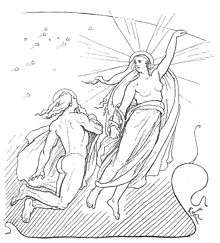Monday
Monday is the day of the week between Sunday and Tuesday.[1] According to the international standard ISO 8601 it is the first day of the week. In countries that adopt the "Sunday-first" convention, it is the second day of the week. The name of Monday is derived from Old English Mōnandæg and Middle English Monenday, originally a translation of Latin dies lunae "day of the Moon".[2]
Names

The names of the day of the week were coined in the Roman era, in Greek and Latin, in the case of Monday as ἡμέρᾱ Σελήνης, diēs Lūnae "day of the Moon".[2]
Many languages use terms either directly derived from these names, or loan-translations based on them. The English noun Monday derived sometime before 1200 from monedæi, which itself developed from Old English (around 1000) mōnandæg and mōndæg (literally meaning "moon's day"), which has cognates in other Germanic languages, including Old Frisian mōnadeig, Middle Low German and Middle Dutch mānendag, mānendach (modern Dutch Maandag), Old High German mānetag (modern German Montag), and Old Norse mánadagr (Swedish and Norwegian nynorsk måndag, Icelandic mánudagur. Danish and Norwegian bokmål mandag). The Germanic term is a Germanic interpretation of Latin lunae dies ("day of the moon").[3] Japanese and Korean share the same ancient Chinese words '月曜日' (Hiragana:げつようび, translit. getsuyо̄bi, Hangul:월요일) for Monday which means "day of the moon". In many Indo-Aryan languages, the word for Monday is Somavāra or Chandravāra, Sanskrit loan-translations of "Monday".[4]
In some cases, the "ecclesiastical" names are used, a tradition of numbering the days of the week in order to avoid the "pagan" connotation of the planetary names, and to keep with the biblical name, in which Monday is the "second day" (Hebrew יום שני, Greek Δευτέρα ἡμέρα, Latin feria secunda, Arabic الأثنين ). In many Slavic languages the name of the day translates to "after Sunday/holiday". Russian понедельник (ponyedyelnik) literally translated, Monday means "next to the week", по "next to" or "on" недельник "(the) week" Croatian and Bosnian ponedjeljak, Serbian понедељак (ponedeljak), Ukrainian понеділок (ponedilok), Bulgarian понеделник (ponedelnik), Polish poniedziałek, Czech pondělí, Slovak pondelok, Slovenian ponedeljek. In Turkish it is called pazartesi, which also means "after Sunday".
Position in the week
Historically, the Greco-Roman week began with Sunday (dies solis), and Monday (dies lunae) was the second day of the week. It is still the custom to refer to Monday as feria secunda in the liturgical calendar of the Roman Catholic Church. Quakers also traditionally referred to Monday as "Second Day".[5] The Portuguese and the Greek (Eastern Orthodox Church) also retain the ecclesiastical tradition (Portuguese segunda-feira, Greek Δευτέρα "devtéra" "second"). Likewise the Modern Hebrew name for Monday is yom-sheni (יום שני).
In modern times, it has become more common to consider Monday the first day of the week. The international ISO 8601 standard places Monday as the first day of the week, and this is widely used on calendars in Europe and in international business. Monday is xīngqīyī (星期一) in Chinese, meaning "day one of the week". Modern Western culture usually looks at Monday as the beginning of the workweek.
Religious observances
Christianity
In the Eastern Orthodox Church Mondays are days on which the Angels are commemorated. The Octoechos contains hymns on this theme, arranged in an eight-week cycle, that are chanted on Mondays throughout the year. At the end of Divine Services on Monday, the dismissal begins with the words: "May Christ our True God, through the intercession, s of his most-pure Mother, of the honourable, Bodiless Powers (i.e., the angels) of Heaven…". In many Eastern monasteries Mondays are observed as fast days; because Mondays are dedicated to the angels, and monks strive to live an angelic life. In these monasteries the monks abstain from meat, fowl, dairy products, fish, wine and oil (if a feast day occurs on a Monday, fish, wine and oil may be allowed, depending upon the particular feast).
The Church of Jesus Christ of Latter-day Saints spend one evening per week called Family Home Evening (FHE) or Family Night usually Monday, that families are encouraged to spend together in study, prayer and other family activities. Many businesses owned by Latter-Day Saints close early on Mondays so they and their customers are able to spend more time with their families.
Islam
In Islam, Mondays are one of the days in a week in which Muslims are encouraged to do voluntary fasting, the other being Thursdays. There are a number of Hadith which narrated of prophet Muhammad fasting on these days.[6][7]
According to the same Hadith, prophet Muhammad was born on Monday.[6][7] It is also narrated that he received his first revelation (which would later become the Qur'an) on Monday.
Judaism
In Judaism Mondays are considered auspicious days for fasting. The Didache warned early Christians not to fast on Mondays to avoid Judaizing, and suggests Wednesdays instead.
In Judaism a small portion of the weekly Parashah in Torah is read in public on Monday and Thursday mornings, as a supplement for the Saturday reading). Special penitential prayers are recited on Monday, unless there is a special occasion for happiness which cancels them. According to the Mishna and Talmud, these traditions are due to Monday and Thursday being "the market days" when people gathered from the towns to the city.
A tradition of Ashkenazi Jews to voluntarily fast on the first consecutive Monday Thursday and Monday of the Hebrew month is prevailant among the ultra orthodox.
In Hebrew, Monday is called "Yom Shayni," meaning literally "Second Day" following the biblical reference to the sabbath day as the "Seventh day" and the tradition of that day being on Saturday. It has been established that the phonetic and cultural link between the planet Saturn, Saturday and the Sabbath day are of ancient Mesopotanian origin[8]
Cultural references

A number of popular songs in Western culture feature Monday, often as a day of depression, anxiety, avolition, hysteria, or melancholy (mostly because of its association with the first day of the work week). For example, "Monday, Monday" (1966) from the Mamas & the Papas, "Rainy Days and Mondays" (1971) from the Carpenters, "I Don't Like Mondays" (1979) from the Boomtown Rats, Monday, Monday, Monday (2002) from Tegan and Sara, and "Manic Monday" (1986) from the Bangles (written by Prince).
There is a band named the Happy Mondays and an American pop punk band Hey Monday.
The popular comic strip character Garfield by Jim Davis is well known for his disdain for Mondays.[9]
In the United Kingdom, more people commit suicide in England and Wales on Mondays than other days of the week;[10] more people in the country in general call in sick;[11] and more people worldwide surf the web.[12]
During July 2002, the consulting firm of PricewaterhouseCoopers Consulting briefly announced that it would rename itself to Monday, and spend $110 million over the next year to establish that brand before it later reversed that decision.[13]
Named days
- Big Monday
- Black Monday
- Blue Monday
- Clean Monday (Ash Monday)
- Cyber Monday
- Easter Monday also Bright Monday or Wet Monday
- First Monday
- Handsel Monday
- Lundi Gras
- Mad Monday
- Miracle Monday
- Plough Monday
- Shrove Monday
- Weather Market Monday, the day when commodity markets add or subtract weather premium
- Wet Monday
- Whit Monday
See also
| Look up Monday in Wiktionary, the free dictionary. |
- Monday Club
- Monday demonstrations
- Monday Night Football
- Monday Night Raw
- WCW Monday Nitro
- Monday Night Wars
- Saint Monday
Notes
- "Monday Meaning". Cambridge Dictionary.
- "monday". Online Etymology Dictionary.
- Barnhart (1995:485).
- Turner (1962). "sōmavāra 13610". A comparative dictionary of the Indo-Aryan languages. London: Oxford University Press. Digital Dictionaries of South Asia, University of Chicago. p. 784. Archived from the original on 15 December 2012. Retrieved 21 February 2010.
sōmavāra 13610 sōmavāra masculine 'Monday' inscription [sṓma the plant, vāra 2 meaning day]
- "Guide to Quaker Calendar Names". Iowa Yearly Meeting (Conservative) Religious Society of Friends (Quakers). Retrieved 30 March 2017.
In the 20th Century, many Friends began accepting use of the common date names, feeling that any pagan meaning has been forgotten. The numerical names continue to be used, however, in many documents and more formal situations."
- "Is it better to fast on Mondays and Thursdays or on three days of each month? - Islam Question & Answer". Retrieved 17 June 2019.
- "Fasting on mondays - Islamhelpline". Retrieved 17 June 2019.
- Saturn Jews, Eric Zafran Journal of the Warburg and Courtauld Institutes. See also Hebrew University Professor Moshe Idel's book, Saturn Jews, and Shlomo Sela's article Saturn and the Jews (University of Pennsylvania) about trends in late Judaism distancing it from the link between the Sabbath day and Saturn.
- Minow, Neil (3 November 2014). "Jim Davis Explains Why Garfield Loves Lasagna and Hates Mondays and Why People Love Garfield". Retrieved 28 March 2016.
- Carvel, John (26 August 2005). "Monday is most common day for suicide". The Guardian. London.
- "Monday is 'the most popular sick day'". Blog.taragana.com. 10 November 2009. Archived from the original on 27 April 2010. Retrieved 30 April 2013.
- "OneStat Website Statistics and website metrics – Press Room". Onestat.com. 9 April 2003. Retrieved 30 April 2013.
- Blakely, Beth. "Monday: PwC Consulting's new name creates controversy, cackles | TechRepublic". Articles.techrepublic.com.com. Retrieved 30 April 2013.
References
| Wikimedia Commons has media related to Monday. |
| Wikiquote has quotations related to: Monday |
- Barnhart, Robert K. (1995). The Barnhart Concise Dictionary of Etymology. Harper Collins. ISBN 0-06-270084-7
